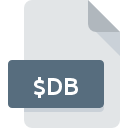
$DB File Extension
DBASE IV Temporary Format
-
Category
-
Popularity3.4 (5 votes)
What is $DB file?
$DB filename suffix is mostly used for DBASE IV Temporary Format files. $DB files are supported by software applications available for devices running . $DB file format, along with 243 other file formats, belongs to the Backup Files category. dBASE is by far the most used program for working with $DB files. On the official website of dataBased Intelligence, Inc. developer not only will you find detailed information about thedBASE software, but also about $DB and other supported file formats.
Programs which support $DB file extension
$DB files can be encountered on all system platforms, including mobile, yet there is no guarantee each will properly support such files.
How to open file with $DB extension?
Being unable to open files with $DB extension can be have various origins. Fortunately, most common problems with $DB files can be solved without in-depth IT knowledge, and most importantly, in a matter of minutes. We have prepared a listing of which will help you resolve your problems with $DB files.
Step 1. Get the dBASE
 Problems with opening and working with $DB files are most probably having to do with no proper software compatible with $DB files being present on your machine. The solution to this problem is very simple. Download dBASE and install it on your device. The full list of programs grouped by operating systems can be found above. One of the most risk-free method of downloading software is using links provided by official distributors. Visit dBASE website and download the installer.
Problems with opening and working with $DB files are most probably having to do with no proper software compatible with $DB files being present on your machine. The solution to this problem is very simple. Download dBASE and install it on your device. The full list of programs grouped by operating systems can be found above. One of the most risk-free method of downloading software is using links provided by official distributors. Visit dBASE website and download the installer.
Step 2. Verify the you have the latest version of dBASE
 If the problems with opening $DB files still occur even after installing dBASE, it is possible that you have an outdated version of the software. Check the developer’s website whether a newer version of dBASE is available. It may also happen that software creators by updating their applications add compatibility with other, newer file formats. The reason that dBASE cannot handle files with $DB may be that the software is outdated. All of the file formats that were handled just fine by the previous versions of given program should be also possible to open using dBASE.
If the problems with opening $DB files still occur even after installing dBASE, it is possible that you have an outdated version of the software. Check the developer’s website whether a newer version of dBASE is available. It may also happen that software creators by updating their applications add compatibility with other, newer file formats. The reason that dBASE cannot handle files with $DB may be that the software is outdated. All of the file formats that were handled just fine by the previous versions of given program should be also possible to open using dBASE.
Step 3. Set the default application to open $DB files to dBASE
If you have the latest version of dBASE installed and the problem persists, select it as the default program to be used to manage $DB on your device. The next step should pose no problems. The procedure is straightforward and largely system-independent

The procedure to change the default program in Windows
- Right-click the $DB file and choose option
- Click and then select option
- Finally select , point to the folder where dBASE is installed, check the Always use this app to open $DB files box and conform your selection by clicking button

The procedure to change the default program in Mac OS
- From the drop-down menu, accessed by clicking the file with $DB extension, select
- Proceed to the section. If its closed, click the title to access available options
- Select dBASE and click
- A message window should appear informing that This change will be applied to all files with $DB extension. By clicking you confirm your selection.
Step 4. Verify that the $DB is not faulty
You closely followed the steps listed in points 1-3, but the problem is still present? You should check whether the file is a proper $DB file. Problems with opening the file may arise due to various reasons.

1. Check the $DB file for viruses or malware
If the file is infected, the malware that resides in the $DB file hinders attempts to open it. Scan the $DB file as well as your computer for malware or viruses. If the scanner detected that the $DB file is unsafe, proceed as instructed by the antivirus program to neutralize the threat.
2. Check whether the file is corrupted or damaged
If you obtained the problematic $DB file from a third party, ask them to supply you with another copy. It is possible that the file has not been properly copied to a data storage and is incomplete and therefore cannot be opened. If the $DB file has been downloaded from the internet only partially, try to redownload it.
3. Ensure that you have appropriate access rights
Sometimes in order to access files user need to have administrative privileges. Switch to an account that has required privileges and try opening the DBASE IV Temporary Format file again.
4. Check whether your system can handle dBASE
If the system is under havy load, it may not be able to handle the program that you use to open files with $DB extension. In this case close the other applications.
5. Verify that your operating system and drivers are up to date
Regularly updated system, drivers, and programs keep your computer secure. This may also prevent problems with DBASE IV Temporary Format files. It is possible that one of the available system or driver updates may solve the problems with $DB files affecting older versions of given software.
Do you want to help?
If you have additional information about the $DB file, we will be grateful if you share it with our users. To do this, use the form here and send us your information on $DB file.

 Windows
Windows 
